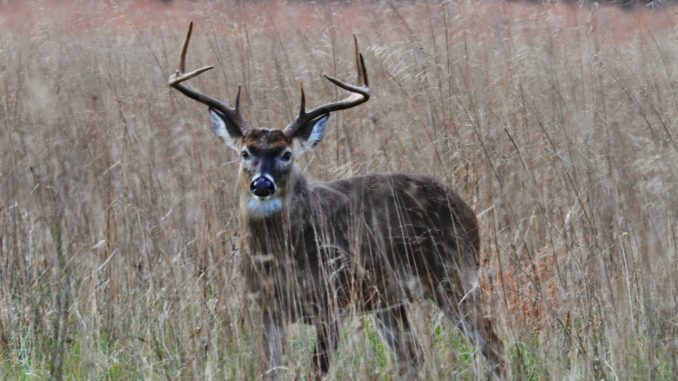
Section 14 of N.C. Farm Bill is stripped by Republican Caucus
A huge outpouring of opposition from North Carolina hunters and other sportsmen led to a section of the N.C. Farm Bill of 2015-16 that would have shifted oversight of deer farms from the N.C. Wildlife Resources Commission to the N.C. Department of Agriculture and Consumer Services being stripped from the bill on Thursday.
After a preliminary vote count, the Republican Caucus realized the House overwhelmingly opposed taking away oversite of deer farms from the Commission, then rewrote that portion of the bill. The House then voted 86-13 to approve the rewrite.
Section 14 of the bill would have taken management of penned whitetail deer, elk, moose, axis, fallow and red deer from the Commission and given it to Agriculture, giving that agency the ability to allow importation of farmed deer and allow more in-state deer farms. However, the House-approved bill bans importation of all cervids into North Carolina, and the Commission retains total authority to manage cervids and deer farms.
“After a lot of conversations, debates and grassroots efforts by the sportsmen community, they agreed to strike Section 14 and replace it with a ban on the importation of cervids, and the (Commission) retains authority of deer management,” said Tim Gestwicki, CEO of the N.C. Wildlife Federation, one of several conservation groups to oppose the move. “We were in Raleigh for a week, and it was apparent there was a large groundswell of support from various constituents that it was an ill-considered, unnecessary move.
“It’s a good win for sportsmen, a good win for the resource, and a good win for the agencies charged with managing our wildlife resources.”
Opposition centered on the chances for Chronic Wasting Disease, a fatal disease that infects some species of deer, to enter North Carolina through imported animals, infect resident deer and eventually get into North Carolina’s wild deer herd. The Commission had managed deer farms very strictly to ensure that CWD never enters the state.
The N.C. Deer and Elk Farmers Association, led by former Food Lion CEO Tom Smith and pushed in the House by Rep. Roger West (R-Cherokee/Clay/Graham/Macon) initiated the cervid-authority transfer process because U.S. Department of Agriculture rules aren’t as tough as Commission rules.
North Carolina hunters annually provide $1.6 billion to the state’s economy, including $511,546,347 spent on hunting-related activities. Deer hunting is responsible for $856,474,221 in sales, $251,130,696 in net income and 8,851 hunting-industry-related jobs.
“When the bill was headed to floor, and supporters found out (the entire bill) was going to be killed, the Republican Caucus decided to meet,” said Richard B. “Dick” Hamilton, director of the N.C. Camouflage Coalition. “They discussed it Wednesday, then Thursday they got really serious, because a majority of members were opposed to transferring deer to Agriculture; they’d done a head count. Then they decided to write a committee substitute to address (deer-farm) concerns.”
Gestwicki praised Rep. Jay Adams (R-Catawba) and Rep. Larry Yarborough (R-Granville/Person) for shepherding the removal of Section 14 from the bill. Adams, a freshman representative, held up against personal and political pressure from his own party, including West.
During the run-up to the vote, N.C’s. Agriculture Commissioner Steve Troxler addressed Democrat and Republican caucuses in an attempt to keep Section 14 in Senate Bill 513, but the committee’s vote was so overwhelming even West finally voted for the substitute.
When a third reading of the bill occurs Monday, Sept. 28, a proposal to drop the last paragraph will be made. That paragraph will hold the Commission to cervid standards no more stringent than USDA rules.
“That change won’t be opposed,” Hamilton said. “We won our three main goals.”
The bill then goes to the Senate, which will vote for or against SB 513 (which contains many other agricultural issues).
If the House and Senate don’t agree, a conference committee made up of members of both legislative bodies will try to solve differences.




Be the first to comment